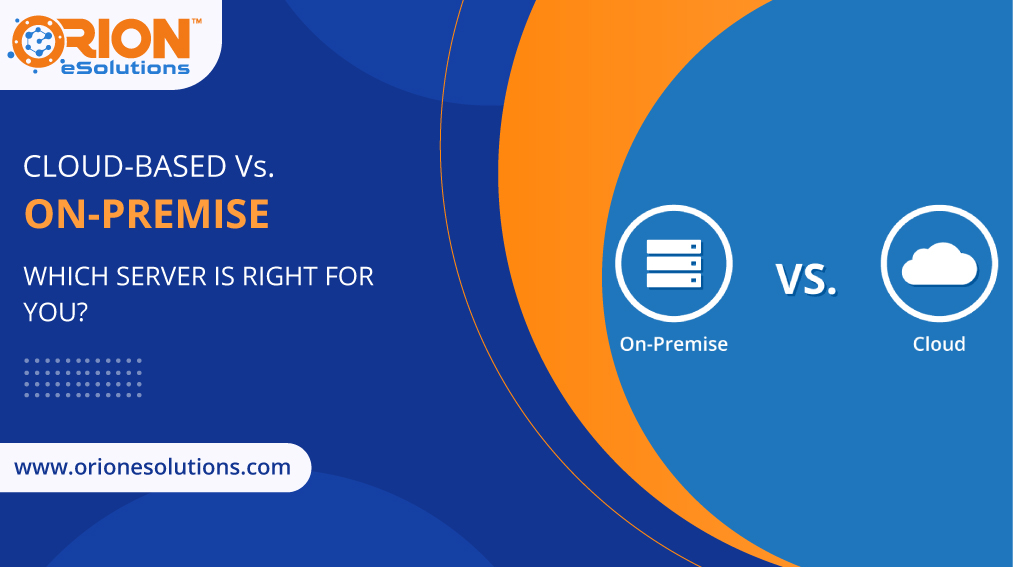All IT companies are faced with one important choice all the time. This choice is whether they should opt for cloud-based or on-premise servers? The fact of the matter is that this choice is in no way linked to one size fits all approach. It is something that depends completely on whatever is important for the business.
In this blog, we will have an in-depth analysis of the pros and cons of both of these servers to find out which options work best. However, before we do that, we must first understand some of the fundamental things.
WHAT IS A SERVER?
A server is a computer or a device that enables the transformation of data. The fundamental purpose of this server is to fulfill requests from other clients. It delivers the information that a computer or client requests. For example; if you order food from an application such as Zomato then, in this case, your request goes to the server of Zomato and gets processed so that the food is delivered to you. A request is made and then a suitable answer is delivered accordingly.
There are two main types of servers. One is on-premise and the other is the cloud. Your goal should be to make sure that you make the right choice for your specific business.
ON-PREMISE SERVERS:
An on-premise server is a physical and an on-site server that a company manages and maintains individually. It requires the company to choose a license, copy or an enterprise purchase of the software to be used. Since the software is licensed, it is way more secure as compared to cloud servers.
CLOUD SERVERS:
A cloud-based server is basically a virtual server that is hosted with the help of cloud computing. It differs from the on-premise server in an important way. A company hosts everything in-house and in an on-premise server, whereas, in a cloud server, a potential third party hosts everything for you.
It uses virtual technology for hosting a company’s applications offsite. There are no major expenses involved, the data can be backed up and companies are only required to pay only for the resources they use. The organizations planning great expansion on a global basis, the cloud has even greater potential since it enables one to stay in connection with partners, customers and other businesses with very little effort.
Why AccuWeb.Cloud?
AccuWeb.Cloud delivers powerful cloud hosting solutions designed for high performance, reliability, and top-tier security—all supported by 24/7 expert assistance. Whether you require the adaptability of cloud hosting or the control of on-premise infrastructure, AccuWeb.Cloud customizes solutions to meet your specific business requirements.
Selecting the right server depends on your business’s scalability, budget, and control priorities, with AccuWeb.Cloud’s advanced cloud solutions, you enjoy the perfect balance of accessibility, efficiency, and security—without the hassle of managing physical hardware.

DIFFERENCES BETWEEN ON-PREMISE AND CLOUD
There are some important differences between the on-premise and cloud servers. In terms of choosing the option that is correct for you, the important thing is to assess the needs of an organization.
- DEPLOYMENT: When it comes to the on-premise environment, the resources are deployed in an in-house IT infrastructure. An organization is responsible for maintaining the solution and all of its related processes. Although there are different types of cloud servers more often than not, the resources are hosted on the premise of the service provider. However, the enterprises are able to access those resources while using it as much as they need at any time.
- COST: For all the organizations that deploy software on-premise servers, it is their responsibility to share the ongoing costs of the server hardware, space, and power consumption. In contrast to this, the organizations that choose to use a cloud computing model only feel the need to pay for the resources they are using without any need to keep with the maintenance costs. Also, the price adjusts up and down based on how much of the cloud server is consumed.
- STABILITY: The enterprises retain all their data in an on-premise environment. They are in complete control of what happens to it, be it good or bad. The organizations belonging to a highly regulated industry come with added privacy concerns are a lot more likely to choose the on-premise servers. On the other hand, when it comes to the cloud computing environment, the stability and ownership of data is something that many companies and vendors struggle with. Since the data and the encryption keys reside with the third-party providers, if there is an unexpected occurring, there is absolutely no downtime for accessing the data.
- SECURITY: The companies that are supposed to handle extremely sensitive information such as hospitals, governments, and the banks are supposed to maintain a level of security and privacy that is offered by an on-premise environment. For all these companies, an on-premise environment is the most suitable. When it comes to the cloud, security concerns are an immediate barrier during deployment. Amongst the multiple publicized cloud breaches, IT departments all over the world get concerned. Right from personal information, login credentials to loss of intellectual property, the security risks are pretty real.
- INTERNET CONNECTION: Since the access to cloud applications need internet access, the on-premise products do not need an internet connection for functioning and have the ability to perform well even at nominal prices. In case you want to make the best out of the cloud server, it is important to make sure that the internet connection is stable. Since the access speed can be influenced by the provider, it is necessary to ensure that it is well regulated.
CONCLUSION
In case you are still undecided then a midway solution will work great for you. The hybrid cloud solutions allow the security of an on-premise server while combining it with the flexibility of a cloud-based system.
After gaining a clear understanding of what you want, it is time to decide which option is the right fit for the organization. Although the advantages of the cloud outweigh the benefits of on-premise without any doubt, it is important to understand that all businesses have different priorities.
In case the organization is a large one with the ability to make a bigger investment then an on-premise server can be pretty good. However, if it is about a small to medium-sized business and there are constraints on the budget then it can be intelligent to go for a cloud-based approach.
We also provide 24/7 Windows Server Administration Service at very affordable cost. You can check it here.









